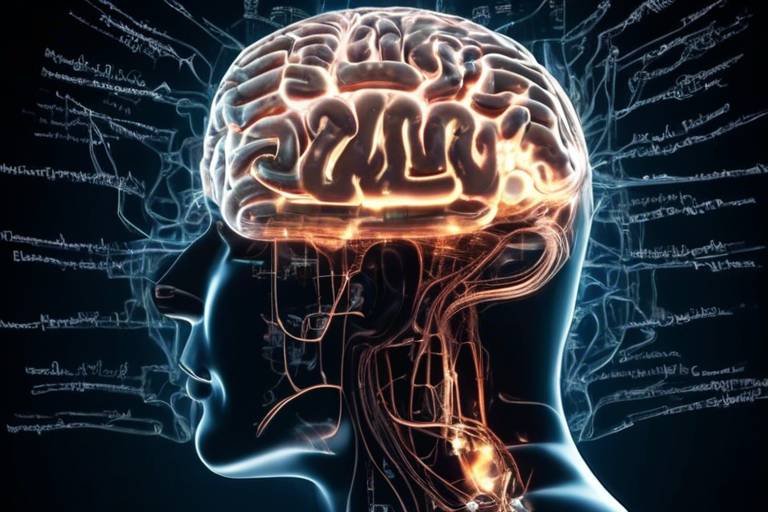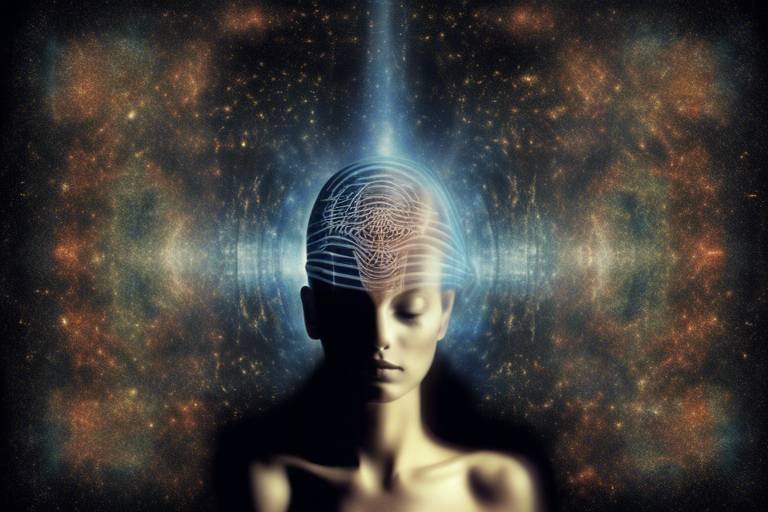The Influence of Philosophy on Neuroscience
The intricate relationship between philosophy and neuroscience is a fascinating exploration of how our understanding of the mind and consciousness has evolved over centuries. Imagine standing at the crossroads of two profound fields—one steeped in the rich tradition of human thought and the other in the empirical rigor of science. This intersection not only shapes our comprehension of what it means to be human but also influences the ethical dimensions of neurological research. As we delve into this topic, it's essential to recognize that philosophy is not merely an abstract discipline; it actively informs the questions that neuroscientists seek to answer. For instance, when researchers probe the depths of the brain to uncover the neural correlates of consciousness, they are often guided by philosophical inquiries about the nature of experience itself.
In this article, we will journey through the historical context that has shaped the dialogue between these two fields. We will examine the key philosophical questions that arise in neuroscience, including the enduring debate surrounding mind-body dualism, the nature of consciousness, and the implications of our findings for ethics and society. By understanding how philosophical thought informs scientific inquiry, we can appreciate the profound impact that these discussions have on our perceptions of identity, free will, and moral responsibility.
As we explore these themes, consider how philosophy challenges us to think critically about our assumptions. For example, when neuroscientists uncover how certain brain regions activate during specific thoughts or emotions, philosophical questions emerge: Does this mean our thoughts are merely the result of neural processes? Or is there something more profound at play? This interplay between empirical evidence and philosophical inquiry enriches our understanding of the human experience, making it a vital area of exploration for both fields.

The Historical Context
The intricate relationship between philosophy and neuroscience can be traced back to ancient times, where early thinkers laid the groundwork for understanding the mind and brain. Philosophers like Plato and Aristotle pondered the nature of existence and consciousness, setting the stage for future inquiries into the human experience. Plato, for instance, viewed the mind as a separate entity from the body, a notion that would echo through the ages, influencing many subsequent philosophical debates.
Fast forward to the 17th century, and we encounter René Descartes, who famously declared, "I think, therefore I am." This statement not only highlights the importance of thought in defining existence but also introduces the concept of mind-body dualism. Descartes proposed that the mind and body are distinct, leading to a plethora of questions about how these two realms interact. His ideas sparked a wave of philosophical inquiry that would deeply impact the development of psychology and neuroscience as we know them today.
As time progressed, the Enlightenment era brought a surge of scientific exploration. Thinkers like David Hume and Immanuel Kant began to challenge the dualistic view, advocating for a more integrated understanding of human experience. Hume's skepticism about causation and Kant's exploration of the limits of human understanding pushed the boundaries of how we perceive the mind and its relationship with the physical world. This period was crucial as it laid the foundation for modern scientific methods that would later be employed in neuroscience.
In the 19th century, the advent of psychology as a formal discipline marked a significant shift. Figures like Wilhelm Wundt and William James focused on studying consciousness through experimental methods, bridging the gap between philosophy and the burgeoning field of neuroscience. Wundt's establishment of the first psychology laboratory in 1879 is often regarded as the birth of experimental psychology, which sought to understand the mind through rigorous scientific inquiry.
In the 20th century, the development of technologies such as functional magnetic resonance imaging (fMRI) and electroencephalography (EEG) revolutionized neuroscience, allowing researchers to observe brain activity in real-time. This technological advancement has enabled a deeper understanding of the brain's workings, but it has also rekindled philosophical debates about the nature of consciousness and the self. As we delve into the complexities of the human brain, we find ourselves asking questions that are as much philosophical as they are scientific.
Today, the dialogue between philosophy and neuroscience is more vibrant than ever. Researchers are not only uncovering the biological mechanisms behind mental processes but are also grappling with the profound implications of their findings. The historical context of this relationship reminds us that the quest to understand the mind is not just a scientific endeavor; it is also a philosophical journey that continues to evolve.
- How did early philosophers influence modern neuroscience?
Early philosophers laid the groundwork for understanding the mind, raising questions that continue to shape scientific inquiry today. - What is mind-body dualism?
Mind-body dualism is the concept that the mind and body are separate entities, a notion popularized by René Descartes. - How have advancements in technology impacted neuroscience?
Technological advancements like fMRI and EEG have allowed for real-time observation of brain activity, deepening our understanding of mental processes.

Key Philosophical Questions
Philosophy is like the compass guiding us through the vast ocean of human experience, and when it comes to neuroscience, it raises some of the most profound questions we can ponder. These inquiries are not just academic; they touch the very essence of what it means to be human. For instance, when we talk about consciousness, we aren't just discussing brain waves and neural connections. We're diving deep into the essence of our existence. What does it mean to be aware? How do our thoughts shape our reality? These questions are crucial for neuroscientists as they probe the workings of the brain.
Another critical area of inquiry revolves around identity. Who are we beyond our physical bodies? Is our identity tied solely to our neurological makeup, or is there something more? This question challenges researchers to consider how our memories, experiences, and even our dreams contribute to our sense of self. It's a complex tapestry that intertwines the biological with the philosophical, making it a fascinating subject for exploration.
Then there's the ever-controversial topic of free will. Do we truly have the ability to make choices, or are our decisions merely the result of neural processes? This question has been debated for centuries and has significant implications for both philosophy and neuroscience. If our choices are determined by brain activity, what does that mean for our sense of agency? Are we just puppets on strings, dancing to the tune of our biology?
To further illustrate these questions, let’s take a look at a table summarizing some of the key philosophical questions and their implications in neuroscience:
| Philosophical Question | Implication in Neuroscience |
|---|---|
| What is consciousness? | Understanding how subjective experiences arise from neural activity. |
| What defines identity? | Exploring how memories and experiences shape our sense of self. |
| Do we have free will? | Examining the extent to which our choices are influenced by brain processes. |
These questions are not just theoretical musings; they have real-world implications. For example, if neuroscience shows that our decisions are heavily influenced by brain chemistry, it could reshape our legal systems and societal norms around accountability and punishment. The interplay between philosophy and neuroscience is not just academic; it’s a dialogue that shapes our understanding of humanity itself.
As we continue to explore these questions, it becomes increasingly clear that the relationship between philosophy and neuroscience is a dynamic one. Each field informs and challenges the other, leading to a richer understanding of the mind and its mysteries. The answers may not be clear-cut, but the journey of inquiry is what makes this intersection so fascinating.

Mind-Body Dualism
Mind-body dualism is a fascinating concept that has its roots in the philosophical musings of René Descartes, who famously declared, "I think, therefore I am." This idea posits that the mind and body are fundamentally different entities; the mind is non-physical and the body is physical. While this may sound straightforward, it opens up a Pandora's box of questions regarding the relationship between our thoughts, emotions, and bodily experiences. How can something as intangible as thought interact with the physical brain? This is the crux of the debate that continues to engage both philosophers and neuroscientists alike.
Descartes' perspective laid the groundwork for centuries of inquiry, yet it also sparked considerable criticism. Many argue that dualism creates a disconnect between mental states and brain activity, complicating our understanding of how feelings and thoughts emerge from neural processes. For instance, when we feel joy or sadness, what happens in our brain? Are these emotions simply the result of chemical reactions, or do they transcend mere biology? This dichotomy raises profound questions about the nature of consciousness and the self.
To illustrate the implications of dualism, consider the following points:
- Separation of Mind and Body: Dualism suggests a clear distinction between mental phenomena and physical processes, which can lead to misunderstandings about how we experience reality.
- Impact on Treatment: If the mind is separate from the body, treating mental illness may require different approaches than those used for physical ailments, complicating healthcare strategies.
- Philosophical Dilemmas: Dualism raises questions about free will, personal identity, and moral responsibility, challenging our understanding of what it means to be human.
Critics of dualism argue that it fails to account for the intricate ways in which mental states are influenced by physical processes in the brain. This viewpoint has led to the exploration of alternative theories, such as physicalism, which asserts that everything about the mind can be explained through physical interactions. As neuroscience continues to advance, the dialogue between these perspectives remains crucial. After all, understanding the mind is not just an academic pursuit; it has real-world implications for mental health treatment, legal systems, and our very conception of identity.
In summary, mind-body dualism presents a captivating yet contentious framework for discussing the relationship between our mental experiences and physical reality. As we delve deeper into the workings of the brain, the questions it raises become ever more pertinent, urging us to reconsider what we know about consciousness, identity, and the human experience.

Challenges of Dualism
The concept of dualism, primarily associated with the philosopher René Descartes, posits that the mind and body are fundamentally distinct entities. This idea has sparked significant debate within both philosophical and scientific circles. One of the main challenges posed by dualism is its inability to adequately explain how mental states can arise from physical processes in the brain. For example, if thoughts and emotions are purely mental phenomena, how do they interact with the physical brain to produce behavior? This question leaves many neuroscientists scratching their heads, as it complicates the understanding of how our experiences are tied to brain activity.
Critics of dualism argue that it creates a philosophical divide that hinders progress in neuroscience. When researchers attempt to study the brain, they often find themselves grappling with the implications of dualism. If the mind is separate from the body, how can we trust that changes in brain chemistry will affect our thoughts and feelings? This skepticism can lead to a reluctance to embrace findings that link neurological processes to mental experiences, ultimately stalling advancements in both fields.
Moreover, dualism raises questions about the nature of personal identity. If our minds are separate from our bodies, what does that mean for our sense of self? Are we merely biological machines with transient thoughts, or do we possess an enduring essence that transcends our physical form? These inquiries not only challenge neuroscientists but also provoke profound existential reflections. To illustrate, consider how we perceive memories; if they are merely chemical reactions in the brain, what happens to our identity when those memories fade or change? This dilemma underscores the difficulty of reconciling dualistic views with empirical findings in neuroscience.
In recent years, many philosophers and scientists have sought alternatives to dualism, leaning towards frameworks such as physicalism. Physicalism posits that everything about the mind can ultimately be explained through physical processes. This perspective aligns more closely with the findings of neuroscience, which increasingly demonstrates that our thoughts, emotions, and consciousness arise from complex interactions within the brain. However, transitioning from dualism to physicalism is not without its challenges, as it requires a shift in how we think about the mind and its relationship to the body.
In summary, while dualism has played a crucial role in shaping our understanding of the mind, it presents significant challenges for neuroscience. The ongoing dialogue between these fields is essential for unraveling the mysteries of consciousness and personal identity, and fostering a more integrated understanding of human experience. As we continue to explore these profound questions, it becomes increasingly clear that the relationship between philosophy and neuroscience is not just a matter of academic interest; it is a journey into the very essence of what it means to be human.
- What is dualism? Dualism is the philosophical view that the mind and body are two distinct entities that interact with each other.
- Why is dualism a challenge for neuroscience? Dualism complicates the understanding of how mental states arise from physical processes in the brain, creating a philosophical divide that can hinder scientific progress.
- What is physicalism? Physicalism is the belief that everything about the mind can be explained in terms of physical processes, contrasting with dualism.
- How does dualism affect our understanding of personal identity? Dualism raises questions about the nature of self and identity, particularly concerning how memories and consciousness relate to our physical bodies.

Contemporary Perspectives
As we navigate the intricate landscape of philosophy and neuroscience, it's essential to recognize that contemporary perspectives have evolved significantly from the rigid frameworks of the past. Today, many philosophers and neuroscientists advocate for a more integrated approach, seeking to bridge the gap between the subjective experiences of consciousness and the objective data derived from brain research. This evolution has given rise to several compelling theories that challenge traditional notions, particularly mind-body dualism.
One of the most prominent contemporary perspectives is physicalism, which argues that everything about the mind can ultimately be explained through physical processes. Think of it as a grand puzzle where every piece—thoughts, emotions, and experiences—fits together within the framework of brain activity. This perspective suggests that our mental states are not separate entities but rather emerge from complex interactions among neurons and synapses.
Furthermore, the idea of emergent properties has gained traction in recent philosophical discussions. Emergent properties refer to phenomena that arise from a system's complexity, which cannot be understood merely by examining its individual components. For example, consider how a flock of birds moves in unison; the beauty of their flight is not merely a sum of individual birds but a complex interaction that creates a mesmerizing pattern. Similarly, consciousness may be viewed as an emergent property of neural interactions, where the whole is greater than the sum of its parts.
Another intriguing aspect of contemporary thought is the exploration of neurophenomenology, a field that combines phenomenology—the study of conscious experience—with neuroscience. This approach emphasizes the importance of subjective experience in understanding the brain's workings. By integrating first-person accounts with third-person scientific data, researchers aim to create a more holistic understanding of consciousness. Imagine trying to understand a beautiful painting; while the colors and strokes are essential, the emotions and thoughts they evoke are equally crucial to grasping its full meaning.
Moreover, the advent of advanced neuroimaging techniques has revolutionized our understanding of the brain, allowing scientists to observe real-time brain activity during various cognitive tasks. This capability has opened up new avenues for inquiry, prompting questions about how specific brain regions correlate with particular thoughts and behaviors. As we delve deeper into these connections, we must remain mindful of the philosophical implications that arise, particularly concerning our understanding of identity and free will.
In summary, contemporary perspectives in the interplay between philosophy and neuroscience are not merely academic exercises; they are vital to addressing some of the most profound questions about human existence. As we continue to explore the depths of our minds, the collaboration between these two fields promises to yield insights that could reshape our understanding of consciousness, identity, and the very nature of reality itself.
- What is physicalism? Physicalism is the philosophical view that everything about the mind can be explained in terms of physical processes in the brain.
- What are emergent properties? Emergent properties are phenomena that arise from complex systems, which cannot be understood simply by analyzing individual components.
- What is neurophenomenology? Neurophenomenology is an interdisciplinary approach that combines phenomenology and neuroscience to study consciousness, integrating subjective experiences with objective brain data.
- How do neuroimaging techniques contribute to this field? Advanced neuroimaging techniques allow researchers to observe brain activity in real-time, providing insights into how specific brain regions relate to thoughts and behaviors.

Consciousness and Self
When we dive into the depths of consciousness and the concept of the self, we're not just exploring a scientific phenomenon; we're embarking on a philosophical journey that has captivated thinkers for centuries. What does it mean to be conscious? How do we define our identity? These questions are not merely academic; they resonate deeply with our everyday experiences. Imagine for a moment that your consciousness is like a vast ocean, teeming with thoughts, feelings, and memories. Just as the ocean is influenced by the tides, our consciousness is shaped by our interactions with the world around us.
Neuroscience seeks to unravel the complexities of consciousness by examining how neural activity gives rise to our subjective experiences. Researchers are on a quest to understand how the brain transforms sensory input into the rich tapestry of thoughts and emotions that define us. For instance, studies have shown that specific brain regions are activated when we engage in self-reflection, suggesting that our sense of self is not just a static entity but a dynamic process influenced by our environment and experiences.
One intriguing aspect of this exploration is the concept of self-awareness. Have you ever pondered why you can think about your thoughts? This meta-cognitive ability allows us to reflect on our actions and emotions, shaping our identity and guiding our decisions. Neuroscientists have identified areas of the brain, such as the prefrontal cortex, that play a crucial role in this self-referential thinking. It's like having a built-in mirror that not only reflects our image but also our thoughts and feelings, allowing us to navigate the complexities of life.
However, the relationship between consciousness and the self is not without its challenges. Philosophers have long debated whether our sense of self is a continuous thread or a series of fragmented experiences. Some argue that the self is an illusion, a narrative we construct to make sense of our lives. Others maintain that there is an underlying essence that persists through time. This debate is akin to trying to catch smoke with your bare hands—elusive and difficult to grasp.
To further illustrate this intricate relationship, consider the following table that outlines key perspectives on consciousness and self:
| Perspective | Description |
|---|---|
| Dualism | Proposes that the mind and body are distinct entities, leading to debates about their interaction. |
| Physicalism | Argues that all mental states are physical states, suggesting that consciousness arises from brain activity. |
| Phenomenology | Focuses on subjective experiences, emphasizing the importance of personal perception in understanding consciousness. |
As we continue to explore the relationship between consciousness and self, one thing becomes clear: our understanding is still evolving. The interplay between neuroscience and philosophy opens up new avenues for inquiry, challenging us to reconsider our assumptions about what it means to be conscious and how we define our identity. Just as a painter mixes colors to create a unique masterpiece, the fusion of these disciplines promises to enrich our understanding of the human experience.

Ethical Implications
The intersection of philosophy and neuroscience is not just a fascinating intellectual exercise; it brings forth a myriad of that demand our attention. As we delve deeper into the workings of the brain, we must grapple with the moral responsibilities that accompany such profound knowledge. For instance, consider the implications of brain research on our understanding of mental illness. With advancements in neuroscience, we can now pinpoint certain neurological conditions with remarkable precision, but this also raises questions about consent and the treatment of individuals diagnosed with such conditions. Are we prepared to handle the information that neuroscience uncovers about the human mind?
Moreover, the advent of neuroenhancement technologies prompts a significant ethical dilemma. As we explore ways to enhance cognitive abilities or alter emotional states through neurological means, we must ask ourselves: What does it mean to be human? The line between treatment and enhancement can become blurred, leading to potential inequalities in access to these technologies. This brings us to the realm of neuroethics, a field that examines the moral implications of neuroscience and the responsibilities of researchers towards their subjects.
In this context, it is crucial to establish guidelines that protect the rights of individuals involved in neurological studies. For example, informed consent must be more than just a formality; it should ensure that participants fully understand the risks and benefits of their involvement. Furthermore, researchers must be vigilant about the potential misuse of their findings, particularly in areas such as criminal justice. As neuroscience begins to influence societal values and legal systems, we must ponder the implications for accountability and moral responsibility.
To illustrate the complexities of these ethical dilemmas, let’s take a look at a table that highlights some of the key ethical concerns in neuroscience:
| Ethical Concern | Description |
|---|---|
| Informed Consent | Ensuring participants fully understand the implications of their involvement in studies. |
| Privacy | Protecting the confidentiality of neurological data collected from individuals. |
| Neuroenhancement | The ethical implications of using technology to enhance cognitive or emotional functions. |
| Misuse of Findings | Concerns about how neuroscience research might be misapplied in legal or social contexts. |
As we navigate these ethical waters, the conversation must include diverse perspectives from philosophers, neuroscientists, ethicists, and the public. Engaging in open dialogue can help us form a comprehensive understanding of the moral landscape surrounding neuroscience. Ultimately, the goal should be to harness the power of neuroscience responsibly, ensuring that our quest for knowledge does not come at the expense of ethical integrity.
- What is neuroethics? Neuroethics is a field that explores the ethical implications of neuroscience research, focusing on moral responsibilities and the rights of individuals involved in studies.
- How does neuroscience affect our understanding of mental illness? Neuroscience provides insights into the biological underpinnings of mental illnesses, but it also raises ethical questions regarding treatment and consent.
- What are the risks of neuroenhancement? Neuroenhancement technologies can lead to ethical dilemmas related to access, inequality, and the definition of what it means to be human.
- Why is informed consent important in neuroscience? Informed consent ensures that participants understand the risks and benefits of their involvement in research, protecting their rights and autonomy.

Neuroethics
Neuroethics is an emerging field that sits at the crossroads of neuroscience and moral philosophy. As we delve deeper into the workings of the brain, the ethical implications of our findings become increasingly significant. The rapid advancements in neuroscience have not only unveiled the complexities of the human mind but have also raised profound questions about the responsibilities of researchers and the rights of individuals involved in neurological studies. Imagine a world where we can manipulate memories or enhance cognitive abilities; the potential benefits are staggering, but so are the ethical dilemmas.
At the heart of neuroethics are several critical issues that demand our attention:
- Informed Consent: How do we ensure that participants in neurological research fully understand the implications of their involvement? Informed consent becomes a gray area, especially when dealing with vulnerable populations such as those with mental illnesses or cognitive impairments.
- Privacy Concerns: As brain imaging technologies advance, the potential for misuse of neurological data raises alarms. Who owns the data generated from our brains, and how can we protect individuals from unauthorized access or exploitation?
- Neuroenhancement: The idea of enhancing human capabilities through neurological interventions poses ethical questions about fairness and accessibility. Will neuroenhancements create a divide between those who can afford them and those who cannot?
Furthermore, neuroethics compels us to consider the implications of findings from neuroscience on our understanding of human behavior. For instance, if neurological studies reveal that certain behaviors are rooted in brain chemistry, how does that affect our notions of accountability and moral responsibility? This is particularly relevant in legal contexts, where the distinction between free will and determinism is often debated.
In light of these challenges, many researchers advocate for a framework that emphasizes ethical considerations throughout the research process. This includes establishing guidelines that prioritize the welfare of participants, promote transparency, and encourage public discourse about the implications of neuroscientific advancements. By fostering a culture of ethical awareness, we can navigate the complexities of neuroscience while safeguarding individual rights and societal values.
Ultimately, neuroethics serves as a crucial reminder that as we push the boundaries of what is scientifically possible, we must also remain vigilant about the ethical landscape that accompanies our discoveries. The responsibility lies not just with scientists, but with society as a whole to engage in these discussions and ensure that neuroscience benefits humanity in a just and equitable manner.
- What is neuroethics? Neuroethics is the study of the ethical, legal, and social implications of neuroscience, focusing on the responsibilities of researchers and the rights of participants.
- Why is informed consent important in neuroscience research? Informed consent ensures that participants are fully aware of the risks and implications of their involvement, protecting their autonomy and rights.
- What are some ethical concerns related to neuroenhancement? Ethical concerns include issues of fairness, accessibility, and the potential for creating inequalities based on who can afford enhancements.
- How does neuroscience impact our understanding of moral responsibility? Neuroscience challenges traditional notions of free will and accountability by suggesting that many behaviors may have biological underpinnings.

Impact on Society
The impact of neuroscience on society is nothing short of revolutionary, reshaping our understanding of human behavior, morality, and even the legal system. As we delve deeper into the workings of the brain, philosophical questions emerge about how these findings influence our societal values. For instance, consider the implications of neuroscientific discoveries on concepts like accountability and moral responsibility. If our actions can be traced back to neural processes, what does that mean for our justice system? Should individuals be held accountable for actions that are rooted in brain chemistry rather than conscious choice?
Moreover, the intersection of neuroscience and philosophy challenges our traditional views on punishment and rehabilitation. The notion of retributive justice—punishing individuals for their wrongdoings—comes under scrutiny when we recognize that many behaviors may stem from neurological conditions. This realization raises critical questions: Should we focus more on rehabilitation rather than punishment? How can we ensure that our legal systems adapt to these new understandings of the mind?
As we continue to explore these complex issues, the role of neuroscience in shaping societal norms becomes increasingly evident. For example, advancements in understanding mental health can lead to more compassionate approaches to treatment, moving away from stigmatization and towards a model that emphasizes empathy and support. This shift can be illustrated by the following table, which outlines the contrasting views of traditional versus neuroscience-informed approaches to mental health:
| Traditional Approach | Neuroscience-Informed Approach |
|---|---|
| Focus on behavior modification | Focus on understanding brain function |
| Stigmatization of mental illness | Emphasis on empathy and support |
| One-size-fits-all treatments | Personalized, brain-based therapies |
| Punitive measures | Rehabilitative strategies |
Additionally, the influence of neuroscience extends into the realm of public policy. Policymakers are increasingly called upon to consider scientific findings when drafting legislation related to mental health, addiction, and criminal justice. The challenge lies in balancing scientific insights with ethical considerations, ensuring that advancements in neuroscience do not lead to discrimination or misuse of information.
In conclusion, the impact of neuroscience on society is profound and multifaceted. As we navigate the complexities of the brain, we must also engage in philosophical discussions that address the ethical implications of our discoveries. By fostering an ongoing dialogue between neuroscience and philosophy, we can better understand the intricacies of human behavior and create a more just and compassionate society.
- How does neuroscience affect our understanding of free will?
Neuroscience challenges traditional notions of free will by suggesting that many of our decisions may be influenced by unconscious brain processes. - What role does neuroethics play in research?
Neuroethics examines the moral implications of neuroscience research, focusing on issues like consent, privacy, and the potential for misuse of neurological data. - Can neuroscience change how we treat mental illness?
Yes, neuroscience can lead to more effective treatments by providing insights into the biological underpinnings of mental health conditions, promoting personalized care.
Frequently Asked Questions
- What is the relationship between philosophy and neuroscience?
Philosophy and neuroscience are deeply intertwined, with philosophical inquiries shaping our understanding of the mind and consciousness. Philosophical questions about identity, free will, and the nature of experiences guide neuroscientists in their research, helping to frame the questions they seek to answer.
- How has historical philosophy influenced modern neuroscience?
Historical philosophical thought laid the groundwork for modern neuroscience by addressing fundamental questions about the mind and brain. Early philosophers like Descartes explored concepts such as mind-body dualism, which still influences contemporary debates on how mental states relate to physical brain processes.
- What is mind-body dualism?
Mind-body dualism is the idea that the mind and body are two distinct entities. This concept, originating from René Descartes, suggests that mental phenomena are separate from physical brain processes, leading to ongoing debates in neuroscience about how these two realms interact.
- What challenges does dualism present to neuroscience?
Critics argue that dualism complicates our understanding of how mental phenomena arise from physical substrates in the brain. It raises questions about the nature of consciousness and whether mental states can be fully explained through physical processes, which is a key focus of neuroscientific research.
- What are some contemporary perspectives on the mind?
Modern thinkers often explore alternatives to dualism, such as physicalism, which posits that everything about the mind can be explained in terms of physical processes. This perspective encourages a more integrated approach to understanding the relationship between mental states and brain activity.
- Why is consciousness a significant issue in philosophy and neuroscience?
Consciousness is a core issue because it involves understanding how subjective experiences arise from neural activity. Philosophers and neuroscientists alike grapple with questions about what consciousness is and how it can be scientifically studied, making it a fascinating area of inquiry.
- What ethical implications arise from neuroscience research?
The intersection of philosophy and neuroscience raises important ethical questions, such as issues of consent, the treatment of mental illness, and the potential consequences of neuroenhancement. These concerns highlight the need for responsible research practices that respect individual rights.
- What is neuroethics?
Neuroethics is a field that addresses the moral implications of neuroscience, focusing on the responsibilities of researchers and the rights of individuals involved in studies. It seeks to ensure that advancements in neuroscience are aligned with ethical standards and societal values.
- How does neuroscience impact societal values and legal systems?
The findings from neuroscience have a profound influence on societal values and legal systems, prompting philosophical debates about accountability, punishment, and moral responsibility. As we learn more about the brain, we must consider how this knowledge affects our understanding of human behavior.



















